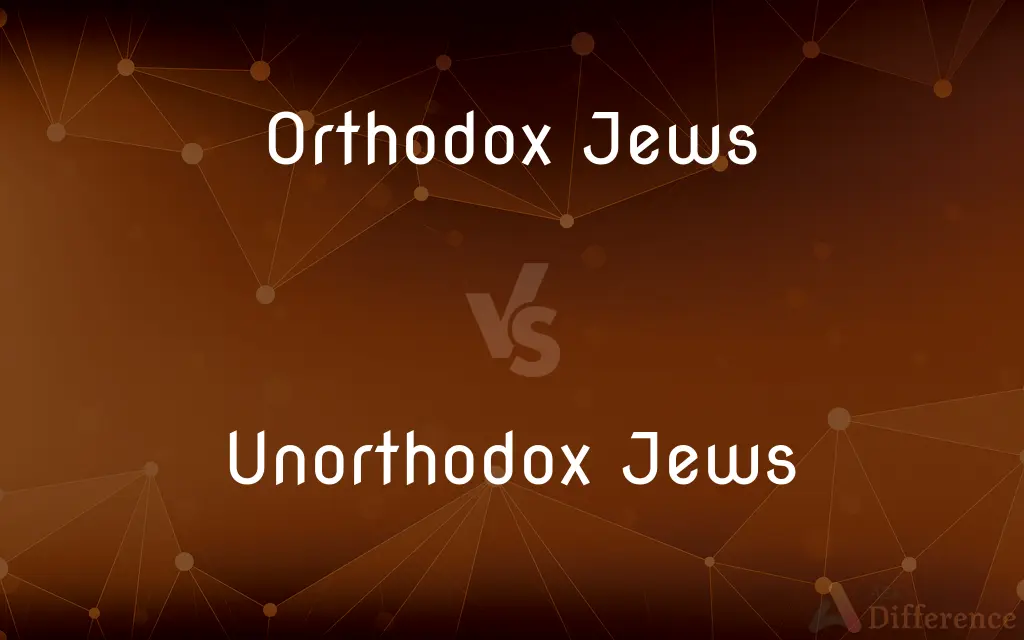Orthodox Jews vs. Unorthodox Jews — What's the Difference?
Edited by Tayyaba Rehman — By Fiza Rafique — Published on December 22, 2023
Orthodox Jews strictly adhere to traditional Jewish laws and practices, while Unorthodox Jews deviate from or don't strictly follow these traditions.

Difference Between Orthodox Jews and Unorthodox Jews
Table of Contents
ADVERTISEMENT
Key Differences
Orthodox Jews represent a segment of Judaism that maintains a strict adherence to traditional Jewish laws, customs, and practices. They are deeply committed to the Torah, both Written and Oral. This dedication affects various aspects of life, from dietary laws to the observance of the Sabbath. In contrast, Unorthodox Jews might belong to different denominations or none at all, and they often interpret or practice Judaism in ways that diverge from traditional standards.
Orthodox Jews typically maintain distinct practices in areas such as kosher dietary laws, prayer rituals, and Sabbath observance. They believe in the divine origin of the Torah and thus see its commandments as immutable. On the other hand, Unorthodox Jews, whether Reform, Conservative, or otherwise, might adapt, modify, or forgo certain traditional practices based on evolving beliefs or societal changes.
For Orthodox Jews, the continuity of tradition is paramount. Many of their practices have remained unchanged for centuries, and they prioritize passing these customs and beliefs down through generations. Unorthodox Jews, while still valuing their Jewish heritage, might be more open to integrating modern ideas or secular practices into their religious life.
One can observe the distinctions between Orthodox Jews and Unorthodox Jews in communal settings. Orthodox synagogues often have separated seating for men and women, and services are predominantly in Hebrew. In contrast, Unorthodox synagogues might have mixed seating and incorporate English or other languages into their services.
Comparison Chart
Adherence to Tradition
Strictly adhere to traditional Jewish laws and practices.
Do not strictly adhere or might deviate from traditional practices.
ADVERTISEMENT
Belief in Torah
Believe in the divine origin of the Torah; see commandments as immutable.
Might interpret the Torah more flexibly or adaptively.
Synagogue Practices
Separate seating for men and women; services mostly in Hebrew.
Might have mixed seating; can incorporate other languages.
Integration of Modern Practices
Less open to integrating secular or modern practices.
More open to integrating modern ideas or secular practices.
Common Denominations (if any)
Haredi, Modern Orthodox.
Reform, Conservative, Reconstructionist, or none.
Compare with Definitions
Orthodox Jews
Adherents of Judaism who follow the Torah's commandments rigorously.
Orthodox Jews keep kosher dietary laws strictly.
Unorthodox Jews
Those who prioritize personal interpretation over strict tradition.
Unorthodox Jews often engage in discussions about evolving Jewish identity.
Orthodox Jews
Jews who strictly observe traditional Jewish laws.
Orthodox Jews refrain from work on the Sabbath.
Unorthodox Jews
Jews who don't strictly follow traditional Jewish customs.
Unorthodox Jews might drive on the Sabbath, which is prohibited in Orthodoxy.
Orthodox Jews
Practitioners who maintain customs largely unchanged for centuries.
Orthodox Jews have distinct prayer rituals and ceremonies.
Unorthodox Jews
Practitioners who might belong to non-traditional Jewish denominations.
Unorthodox Jews might attend a Reform synagogue.
Orthodox Jews
A group that believes in the divine origin of the Torah.
Orthodox Jews study the Talmud to understand the Torah's intricacies.
Unorthodox Jews
Individuals who interpret or adapt Jewish practices based on evolving beliefs.
Some Unorthodox Jews might eat non-kosher food outside their homes.
Orthodox Jews
Those who prioritize continuity in Jewish customs and traditions.
Many Orthodox Jews wear traditional clothing daily.
Unorthodox Jews
Those open to integrating secular practices into their religious life.
Unorthodox Jews may celebrate Jewish holidays with modern twists.
Common Curiosities
Are Unorthodox Jews less religious than Orthodox Jews?
Not necessarily. Unorthodoxy refers to different interpretations or practices, not the depth of religious feeling or belief.
Do all Orthodox Jews dress in a traditional manner?
While many do, especially Haredi Jews, there are Modern Orthodox Jews who might dress in a contemporary manner.
What do Orthodox Jews believe in?
Orthodox Jews believe in the divine origin of the Torah and strictly adhere to traditional Jewish laws and practices.
Are all Unorthodox Jews part of the Reform movement?
No, Unorthodox Jews might belong to Reform, Conservative, Reconstructionist movements, or none at all.
Do Orthodox Jews integrate modern practices into their lives?
While they strictly follow religious laws, many Orthodox Jews do engage with the modern world, though they might separate the secular from the religious.
What's the main difference between Orthodox and Unorthodox Jews?
Orthodox Jews strictly follow traditional Jewish laws, while Unorthodox Jews might interpret or adapt these practices.
Are there different groups within Orthodox Judaism?
Yes, such as Haredi and Modern Orthodox.
Is Unorthodox Judaism a formal denomination?
No, it's a broad term that encompasses various non-traditional interpretations or practices.
How do Orthodox and Unorthodox Jews view the Torah?
Orthodox Jews see it as divine and immutable, while Unorthodox Jews might have a more flexible interpretation.
Are there Unorthodox Jewish religious leaders?
Yes, there are rabbis and leaders within Reform, Conservative, and other movements.
Can someone transition from Orthodox to Unorthodox practices?
Yes, individuals might change their level of observance or beliefs over time.
How do Unorthodox Jews approach traditional Jewish practices?
They might adapt, modify, or even forgo certain practices based on personal belief or societal changes.
Do Orthodox Jews engage with modern technology?
Yes, but they might have specific guidelines or avoid its use on the Sabbath and holidays.
How do Orthodox and Unorthodox Jews differ in synagogue practices?
Differences can include seating arrangements, language of services, and interpretation of rituals.
Are there disagreements between Orthodox and Unorthodox Jewish communities?
Yes, there can be differing views on religious practices, gender roles, and other issues.
Share Your Discovery

Previous Comparison
Few vs. A Few
Next Comparison
Xbox 360 vs. Xbox OneAuthor Spotlight
Written by
Fiza RafiqueFiza Rafique is a skilled content writer at AskDifference.com, where she meticulously refines and enhances written pieces. Drawing from her vast editorial expertise, Fiza ensures clarity, accuracy, and precision in every article. Passionate about language, she continually seeks to elevate the quality of content for readers worldwide.
Edited by
Tayyaba RehmanTayyaba Rehman is a distinguished writer, currently serving as a primary contributor to askdifference.com. As a researcher in semantics and etymology, Tayyaba's passion for the complexity of languages and their distinctions has found a perfect home on the platform. Tayyaba delves into the intricacies of language, distinguishing between commonly confused words and phrases, thereby providing clarity for readers worldwide.












































